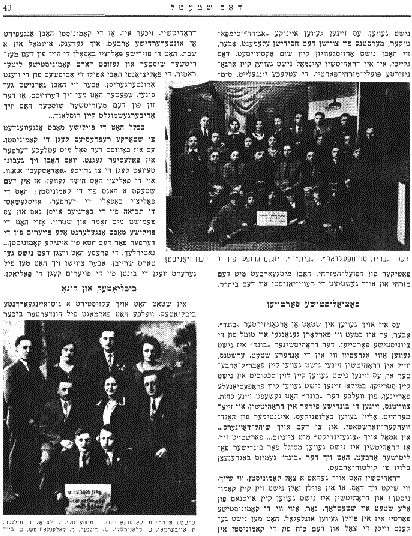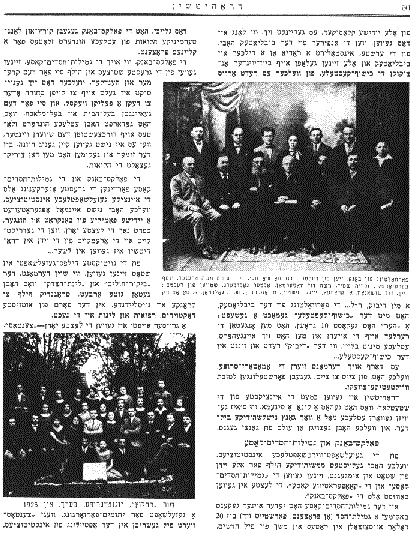Previous Page
|
Next Page
 [
Page 49
]
[
Page 49
]
There were a few Agudah sympathizers, mostly from among the chassidim. There
didn't undertake any activity, however. Similarly, there was never any
organized Poalei Mizrachi party [labor offshoot of the Mizrachi party]. The few
people who were supporters did work together with the Mizrachi, and supported
the Revisionists and Betar.
[Photo:] The Revisionist Youth Group, Brit Trumpeldor/Betar.
Socialist Parties
There was an organized group of
the Bund [Yiddishists] in Drohitchin, but it was unnoticed among all the
activity of the Zionist parties. The Drohitchin branch of the Bund wasn't as
aggressive as branches in other towns. First, because there were no factory
workers in Drohitchin, no wage disputes or strikes, or professional unions to
provide membership for the Bund. Second, most of the Bund leaders in Drohitchin
worked in home workshops and were owners of craft workshops and people who
attended synagogue and people who believed in "sinful" Zionism.
Drohitchin was therefore not a suitable for the Bund's political activity, and
the Bund had to limit itself to cultural activities.
There were also some communists
in Drohitchin. How likely was it for there to be communists in Poland?
Drohitchin was no different than other cities and towns, but since the
Communist Party was illegal in Poland, it wasn't possible to know the actual
number of communists in town, but the fact is that the communists were involved
in underground activity. I remember once that on a Sabbath the Polish police
raided the house of the Mezeritch tailor, looking for communist literature.
They even tore down pictures off the wall, but they didn't find anything. Later
it was discovered that his son had fled to Russia.
Generally speaking, the Polish
authorities took harsh measures against the communists. One of the famous cases
was that of the revolt of some villages in Polesia against high taxes. The
police suspected that the communists were somehow involved. The raided the
villages, seized grain from wagons and threw it out onto the street, mixing it
with sand and straw. This was to teach all the peasants in the villages the
punishment for the sins of a few communists. Naturally, the press didn't write
a word about this, but people talked extensively about the revolt of the
peasants against the Poles.
[Photo:] First Row: M. Kalenkevich, Y. Mishovsky, L. Lewak, B. Milner, K.
Oberman, S. Slonimsky, S. Milner, M. Kalenkevich, S. Beich.
Library and Cinema
There was also a well-stocked library that owned hundreds of books
 [
Page 50
]
[
Page 50
]
covering all Jewish classics. I remember a long time ago the administrators of
the library first installed a radio without a loudspeaker in the library, and
everyone rushed over in amazement to look at the magical device. The
administration of the library created a business with the "magical
device," and charged a fee of 10 groshen for a listening session. You put
on the earphones and were able to listen in for a few minutes to the magical
device's spirit talking over the wire.
Mention should also be made of
the amateur theater group that occasionally gave performances on behalf of
charitable causes. Drohitchin was virtually the only small town with a cinema;
it showed a few pictures and attracted people from all over the area.
The People's Bank and Charity Fund
The Charity Fund and the Cooperative Fund were the community economic
institutions that provided material assistance for all Jews in town and in the
surrounding area. A third institution was the People's Bank. Any individual
could receive a charitable contribution (interest-free) of up to 20 dollars
from the Charity Fund, which could be repaid in installments over many months.
Similarly, the People's Bank provided long- and short-term loans of several
hundred zlotys at a low percentage rate.
[Photo:] Bank directors. Seated from right: David Warshavsky, the slaughterer
Moshe Prager, Yosef Berezovsky, Zechariah Schmid, Moshe David Wasserman, Alter
Goldberg. Standing, from right: Beich, David Shushanov, A. Kravetz, Feigel
Epstein, M. Auerbach, S. Z. Goldman, A. Saratshik.
The People's Bank, as well as
the Charity Fund, were the most important sources of assistance for shopkeepers
and businessmen who needed money to buy merchandise or repay a debt, as well as
for the ordinary householder or artisan who needed a few hundred zlotys to get
through the harsh winter, when there wasn't enough business, until he could
repay the loans in the summer.
The People's Bank and the
Charity Fund were known for their work as the only community institutions
frequently able to save Jewish families from bankruptcy or hunger, especially
in the later years when the pressures of poverty among Jews spread
significantly. As mentioned previously, the respite and health care service
were among the most important forms of assistance to the ill and needy in the
form of doctor services, medicine and overnight company at no charge.
In later years the orphan assistance organization made tremendous contributions
in Drohitchin. A separate section will be devoted to the work of this
organization among the other community institutions.
[Photo:] The Halutz Youth Group, circa 1923.
Previous Page
|
Next Page
This material is made available by JewishGen, Inc.
and the Yizkor Book Project for the purpose of
fulfilling our
mission of disseminating information about the Holocaust and
destroyed Jewish communities.
This material may not be copied,
sold or bartered without JewishGen, Inc.'s permission. Rights may be
reserved by the copyright holder.
JewishGen, Inc. makes no representations regarding the accuracy of
the translation. The reader may wish to refer to the original material
for verification.
JewishGen is not responsible for inaccuracies or omissions in the original work and cannot rewrite or edit the text to correct inaccuracies and/or omissions.
Our mission is to produce a translation of the original work and we cannot verify the accuracy of statements or alter facts cited.
 Drogichin, Belarus
Drogichin, Belarus
 Yizkor Book Project
Yizkor Book Project
 JewishGen Home Page
JewishGen Home Page
Yizkor Book Director, Lance Ackerfeld
This web page created by Lance Ackerfeld
Copyright © 1999-2026 by JewishGen, Inc.
Updated 7 Dec 2001 by LA
 [
Page 49
]
[
Page 49
]



